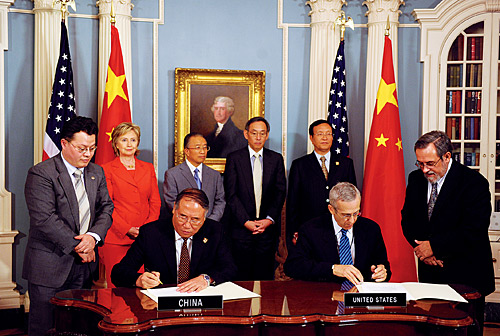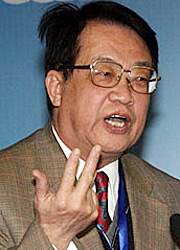|
 |
|
A CONCRETE STEP: Vice Chairman of China's National Development and Reform Commission Xie Zhenhua and U.S. Special Envoy for Climate Change Todd Stern sign the China-U.S. Memorandum of Understanding to Enhance Cooperation on Climate Change, Energy and the Environment in Washington, D.C. on July 28 (SHEN HONG) |
The first round of the China-U.S. Strategic and Economic Dialogue (S&ED) concluded in Washington, D.C. on July 28, ending the first phase of one of the latest and most widely anticipated set of talks between the two nations. Following the event, Beijing Review reporters sat down with two experts with differing views of China-U.S. relations and discussed their predictions for a possible outcome.
Zhou Shijian is a senior fellow with the Research Center for China-U.S. Relations at Tsinghua University in Beijing and Steven Dunaway is an adjunct senior fellow for International Economics of the Council on Foreign Relations in Washington. Excerpts from these interviews follow:
Beijing Review: By the end of May, China held $801.5 billion in U.S. treasury bonds. How can we guarantee the security of our dollar assets?
 |
|
COURTESY OF ZHOU SHIJIAN |
Zhou Shijian: It would be extremely difficult to do so. The U.S. Government has raised a considerable amount of money by issuing dollar notes and treasury bonds to rescue the country's crisis-ridden market. Its deficit in the 2009 fiscal year, which ends on September 30, is projected to reach $1.84 trillion—four times the amount in the previous fiscal year. It is expected to remain high in the 2010 fiscal year, totaling $1.26 trillion.
The benchmark interest rate of the dollar has dropped to 0.25 percent. On March 18, the U.S. Federal Reserve decided to issue more dollars, a move that will lead to inflation. In light of these factors, the depreciation of the dollar is simply predictable. The more dollar assets China has, the more risks it has to face.
So how can China and the United States work out a joint solution to the problem?
China should call on the United States to shoulder its responsibilities as a major financial power. It should tell the United States to stop issuing dollars irresponsibly. The dollar is an international reserve currency. Only 30 percent of all greenbacks are in the United States, with 70 percent being held by other countries. Their excessive issuance affects the world's financial stability. At the same time, China should urge the United States to reduce its fiscal deficit.
What role do you think the China-U.S. S&ED can play in addressing Beijing's concerns about the security of its dollar assets?
The dialogue serves as a platform for the exchange of views. China can raise its demands, but whether these demands can be met is up to the United States. The Americans may argue China's dollar assets are an investment, which always entails risks. However, it should be noted that a stable dollar is not only in the interest of China, but also helps the U.S. economy and the world economy at large.
What is your take on Washington's demand that China open up its government procurement market?
The demand indicates that the United States is eager to cut a slice of the pie. When it entered the World Trade Organization (WTO) in 2001, China did not accede to the WTO's Agreement on Government Procurement. China is taking a prudent attitude toward its accession to the Agreement on Government Procurement. It started negotiations on entering the agreement in 2007, and the negotiations are still underway.
How do you view the prospects of Chinese companies' investment in the United States?
By the end of last year, Chinese companies' investment in the United States had totaled $3.6 billion—as opposed to the more than $60 billion investment U.S. companies have made in China. The United States adopts double standards on foreign direct investment. While investing heavily in China, it interferes with Chinese investment in the United States by political means.
The U.S. market is not open enough to Chinese companies. The China National Offshore Oil Corp.'s failed bid to acquire the U.S. oil company Unocal in 2005 is a telling example.
Are there any conflicts between China and the United States when it comes to dealing with climate change?
The Obama administration, which has put environmental protection at the top of its agenda, calls on China to take on more responsibilities in cutting greenhouse gas emissions together with the United States. China, however, stands for "common but differentiated responsibilities."
Since it is still in the middle stages of industrialization, China emits greenhouse gases for development purposes. In contrast, post-industrial Western countries give off these gases for maintaining their extravagant lifestyles. They should be responsible for the greenhouse gases they discharged in the past, as they pursued industrialization. They are also obligated to transfer technology to developing countries. The United States, lured by China's huge "green market," also wants to sell equipment to China to make money instead of transferring technology to the country, creating another point of contention.
| 